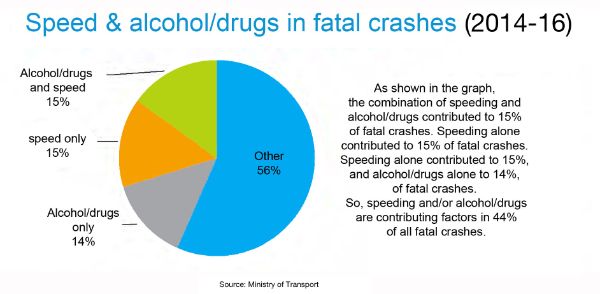Increased Speeding Fines Unlikely To Lower Road Toll
Proposals to increase speeding fines probably won’t reduce road deaths, says the car review website dogandlemon.com.
Editor Clive Matthew-Wilson, who is an outspoken road safety campaigner, says:
“The research is quite clear: the threat of fines and disqualification do not reduce the risk of offending for the groups most likely to cause fatal crashes."
Matthew-Wilson points to a major study by the New South Wales Bureau of Crime Statistics and Research, which tracked 70,000 NSW drivers who were fined for a driving offence between 1998 and 2000.
The researchers, who followed the behavior of these offenders for five years, found no connection between the size of the fine and the likelihood of a further driving offence, including speeding, drink-driving or driving while disqualified.
“In other words, the size of the fine had no effect on the behavior of these drivers.”
Dr Don Weatherburn, Director of the New South Wales Bureau of Crime Statistics and Research, said the findings were consistent with a large body of evidence indicating that, contrary to popular opinion, tougher penalties do not reduce the risk of re-offending.
The same study showed that the threat of disqualification also has no measurable effect on high-risk drivers.
The study found:
“For speeding offences, longer disqualification periods actually made the situation worse because it increased the risk that the offender would drive illegally.”
Matthew-Wilson says a few studies showed a small reduction in repeat speeding by low risk drivers after they were fined, but that the same fines had little effect on higher risk drivers.
“My sister recently got a ticket for accidentally exceeding the speed limit past a school. But she hasn’t had an accident in decades and would have slowed down anyway if someone had drawn her attention to the lowered speed limit.”
"However, virtually all studies show clearly that fines have little or no effect on high risk drivers– the small group of who cause most speed-related accidents.”
Matthew-Wilson gave the example of four teenagers in Invercargill who were killed in April when their Ford Ranger pickup collided with a concrete truck.
“Perhaps the police could explain how fining ordinary motorists going 1k over the speed limit would have prevented this crash?”

Matthew-Wilson adds: “As a matter of scientific fact, almost all speed-related fatalities are caused by a small group of boguns*, blotto drivers and reckless motorcyclists. Boguns, blotto drivers and reckless motorcyclists don’t read speed signs, rarely think of consequences and are effectively immune to road safety messages.”
A 2009 AA study of 300 fatal crashes concluded:
"government advertising suggests you should be grateful to receive a speeding ticket because it will save your life. In fact, exceeding speed limits aren’t a major issue. Only one in six fatal crashes were reported over the speed limit – and they were well over. Nor is it true that middle-New Zealand drivers creeping a few kilometres over the limit ... dominate the road toll.”
Instead of speed cameras and heavy enforcement campaigns,Matthew-Wilson favours speed advisory signs, which simply show motorists what speed they’re doing, without issuing a ticket.
“Speed advisory signs are highly effective at lowering speeds in high risk zones, but they don’t alienate motorists. The fact is, most ordinary drivers will slow down if you remind them that they’re going too fast. The police can then wait around the corner and ticket those who don’t take the hint.”
Matthew-Wilson adds: “It’s important to remember that the vast majority of accidents don’t involve speed. Even the most pessimistic research suggests about 30% of accidents involve speed. In other words, 70% of accidents are not speed-related.”
“ It’s also important to remember that speed, by itself, is not the problem; it’s how you speed and where you speed that matters. For example, the Waikato Expressway has a speed limit of 110kp/h, which is 10kp/h higher than the average highway speed limit. So, the Waikato Expressway should be a killing field. In fact, the Waikato Expressway is one of the safest roads in the country.”


 Gordon Campbell: Gordon Campbell On The Folly Of Making Apologies In A Social Vacuum.
Gordon Campbell: Gordon Campbell On The Folly Of Making Apologies In A Social Vacuum. Asians Supporting Tino Rangatiratanga: Asian Communities From Across Aotearoa Join Hīkoi Mō Te Tiriti
Asians Supporting Tino Rangatiratanga: Asian Communities From Across Aotearoa Join Hīkoi Mō Te Tiriti Cooper Legal: Censorship Is Alive And Well In New Zealand
Cooper Legal: Censorship Is Alive And Well In New Zealand NZ Government: NZ Signs Trade Deal With Costa Rica, Iceland And Switzerland
NZ Government: NZ Signs Trade Deal With Costa Rica, Iceland And Switzerland Forest And Bird: Modernisation Of Conservation System Must Focus On Improving Conservation
Forest And Bird: Modernisation Of Conservation System Must Focus On Improving Conservation NZCTU: Uniformed Defence Force Should Not Be Used As Strike Breakers
NZCTU: Uniformed Defence Force Should Not Be Used As Strike Breakers MetService: Damp Start To Canterbury Anniversary Weekend; Wet Start For Coldplay Fans In Auckland
MetService: Damp Start To Canterbury Anniversary Weekend; Wet Start For Coldplay Fans In Auckland


